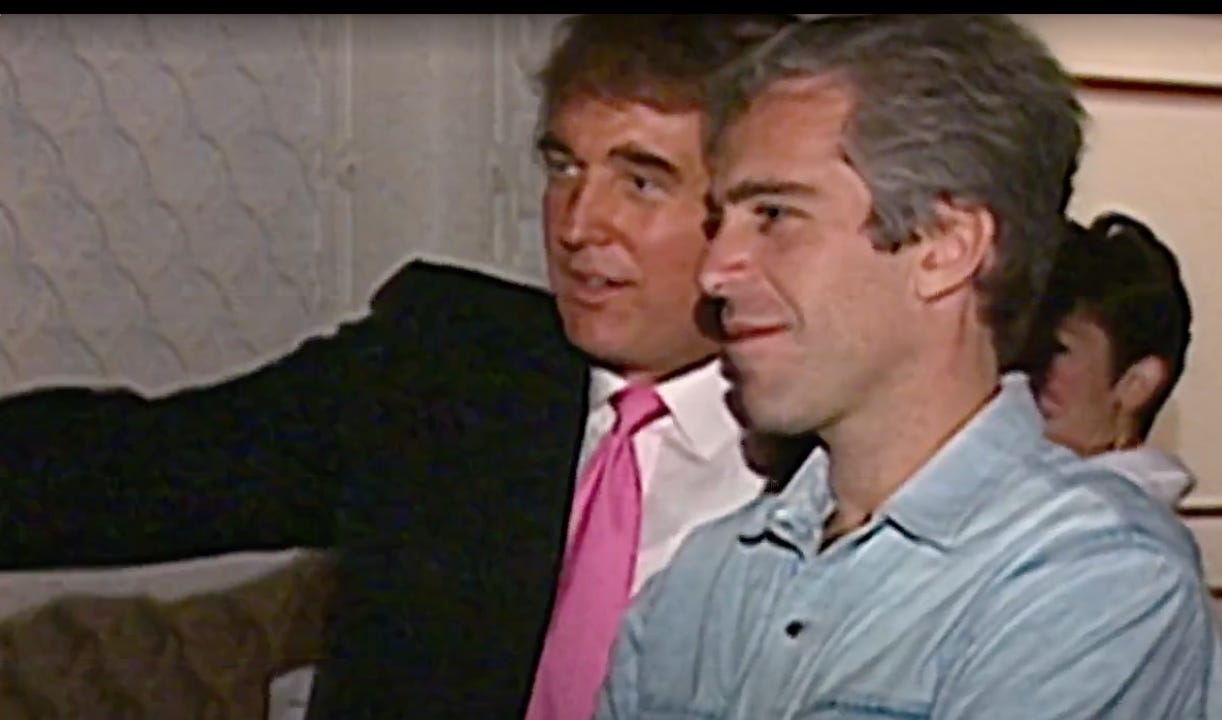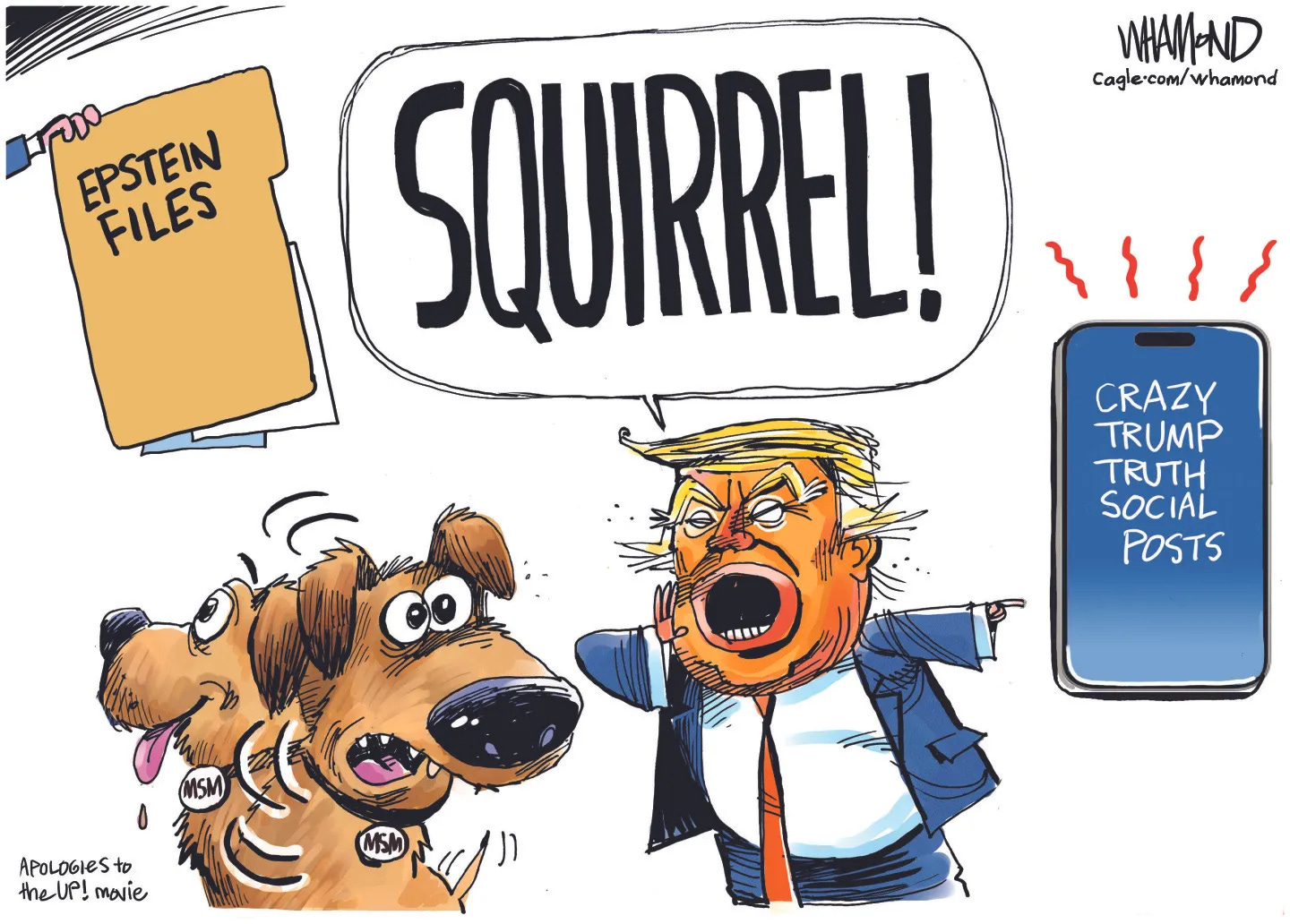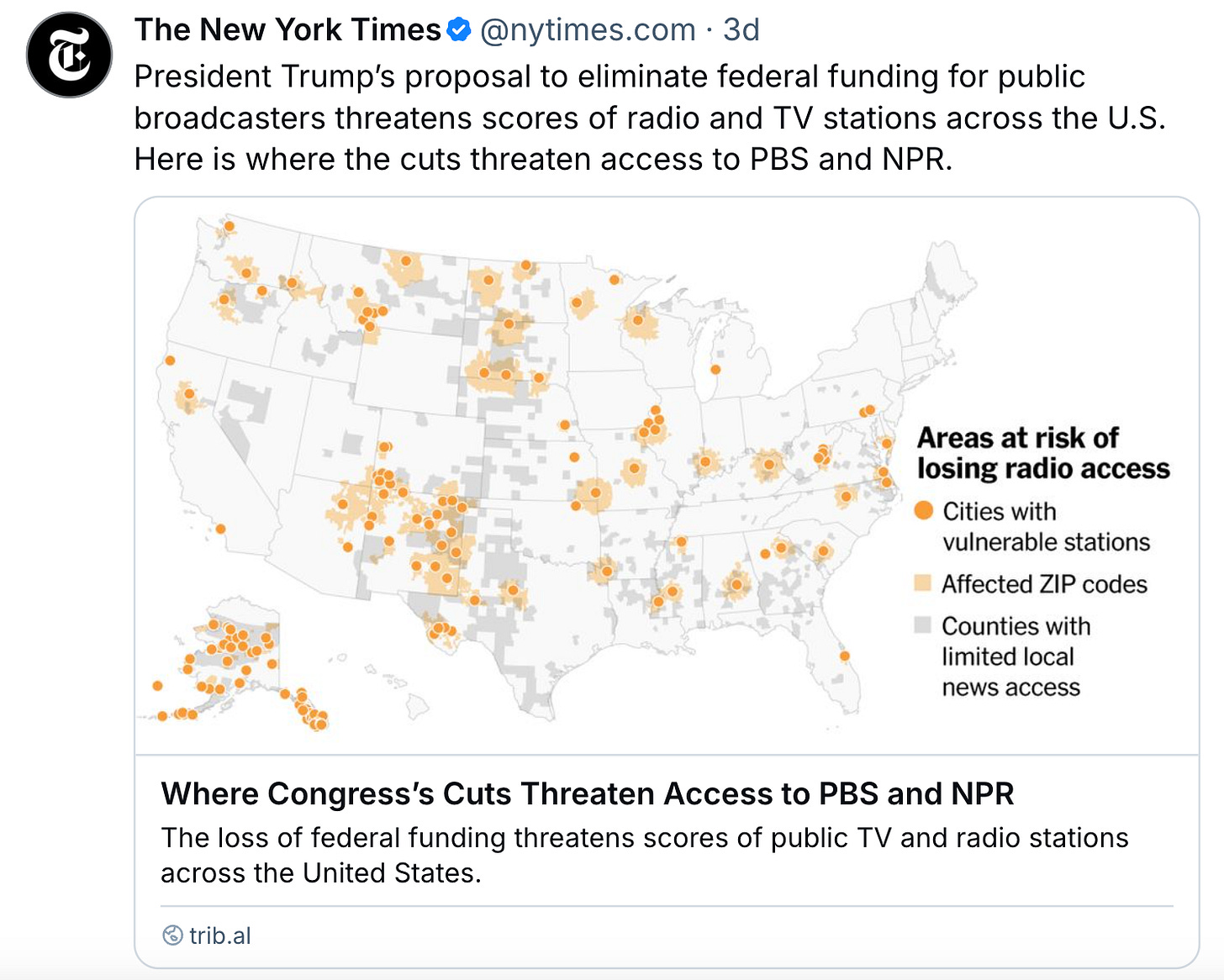Back From The Dead
How badly could the story that won’t die wound the president’s political future?

“In a second term that’s been defined by chaos, unpopular policies, and the dismantling of the federal government, Trump has managed to bounce back from one scandal after another,” Charlie Warzel writes in the latest edition of The Atlantic.
But if there’s “one person who can derail a Trump presidency, it appears that it might be a convicted sex offender who has been dead nearly six years.”
*
In last weekend’s column, I tried really hard not to actually say the name of the elephant in the White House. It quickly became obvious that was going to be impossible. I figured there were plenty of other, far more significant stories that we all – particularly the president – should be thinking about (the top of that newsletter was about the aftermath of the Texas floods, for example). Turns out that was wrong.
In a six-month ‘report card’ Dan Balz at The Washington Post writes on how Trump has been “consumed” by the Epstein story and for now it’s eating away at his presidency.
“Trump would like nothing better than to point to successes in his second term, and he has had some. The swirling Epstein controversy makes that difficult. Trump has tried to dismiss the controversy as Democratic-manufactured fakery, though this was always an issue generated by conspiracy theorists in the president’s base.”
Natalie Allison, also writing at the Post, says Trump has “survived many scandals, but the Epstein story poses a new test.”
“Despite the clamor surrounding Epstein from within the president’s political base and beyond, there is no indication so far that this is the scandal that will sink Trump any more than the “Access Hollywood” tape of 2016, or being found guilty in a criminal trial last year over hush money payments to a porn star. Trump won presidential elections after both.”
In that Atlantic piece quoted at the top, Charlie Warzel says Donald Trump “helped create a monster. Now he’d like for everyone to ignore it.”
Right now, how he handles this will determine how he gets to handle everything else. This week, that didn’t seem to be going so well. His attempts at distracting and diluting the news narrative – something he has previously employed successfully – have largely fallen flat, from sugar in Coca-Cola, to the firing of James Comey’s daughter from her post as a former Epstein prosecutor, to demanding the changing back of the names of the Washington Commanders and Cleveland Guardians.
Trump’s Director of National Intelligence Tulsi Gabbard also suggested the possible prosecution of Obama administration officials related to the 2016 election; while new details about Trump’s health condition have been claimed by one loyalist to be the result of “fighting the radicals”.

*
Michael Kruse writes at Politico:
Trump “has and always has had a real instinct for story — not just the ephemera of gossip, which he loves, but big, long-arc, animating sort of superstories, too. One of the most powerful stories in human history is us against them. And it’s been fuel for Trump’s electoral rise and rule — the notion he’s stoked that he’s an avenger for regular people who are the us set against elites and other assorted foes that make up the them. The Epstein story isn’t going away (or at least wasn’t?) because it complicates this superstory.”
Meanwhile, the president’s $10bn defamation law suit against the Wall Street Journal has focused even greater attention on the issue – and could be a risky legal strategy according to some legal analysts, including Elie Honig, a former state and federal prosecutor.
“I’m not so sure Donald Trump has fully thought this one through,” CNN’s senior legal analyst replied, before noting Trump’s giddiness at the thought of Murdoch’s testimony.
“Well guess who else is going to have to testify under oath at a deposition: the plaintiff in this case, the person who’s suing, Donald John Trump,” Honig noted. “And the subject of that testimony, which again, will be under oath, will be his relationship with Jeffrey Epstein. No holds barred.”
At the Columbia Journalism Review, Jon Allsop writes:
“The suit marked yet another escalation in Trump’s efforts to kill unfavorable reporting; he has sued major outlets before, of course, but CNN’s Brian Stelter noted that he has never done so while actually in office, and none of the legal experts Stelter canvassed could recall any sitting president going after a news outlet for defamation. It also, of course, more or less guaranteed that this particular example of unfavorable reporting will remain in the news for as long as the lawsuit plays out, which, as Stelter noted, could be years. Someone really needs to tell Trump about the Streisand Effect.”
Even with a disapproval rating at its highest in his second term, Trump’s overall approval among Americans still stands at 44 per cent, while taking on the “elite” WSJ appears to have – at least superficially – given his base an opportunity for a ‘rally round the flag’ moment. (His approval among Republicans alone remains in the upper 80s.)
Politico reported:
“The sudden rush to defend Trump comes after weeks of intraparty fighting during which influential conservatives such as Laura Loomer warned the “poorly” handled Epstein saga could “consume” Trump’s presidency, and the president said he no longer wanted the support of people who believed in the Epstein “hoax.”
But the longer MAGAworld continues to run in circles trying to figure out whether Trump likes them or not any more – with even the infamous Nick Fuentes famously saying “The Liberals were right” – and the longer this goes with fresh developments each day, it could inevitably start to feel like death by a thousand cuts.
One aspect of this multi-faceted story worth keeping an eye on going forward will be the role of Vice-President JD Vance, who had previously called for the release of the "Epstein list". Vance is understood to have flown to Montana last month to meet with Rupert Murdoch, his son Lachlan – the head of News Corp – and other executives.
See Also:
Of Bombs And F-Bombs – Can we really *know* anything anymore, or just what Trump says?
**
Fed Up
At the weekend, the president pushed back at another WSJ story, this one reporting that he had been talked out of firing Fed Chair Jerome Powell by Treasury Secretary Scott Bessent.
Meanwhile, on Friday the House passed Trump’s controversial bill clawing back $9bn worth of previously approved funding – including for foreign aid and zeroing out government funds for public broadcasting. Only two House Republicans voted against the bill.
Frank Langfitt writes for NPR on how some of those hardest hit by cuts to the network will be “small radio operations that provide local news and information to rural communities,” while there have also been warnings of the impact of the cutbacks in terms of public broadcasters’ ability to deliver timely alerts about extreme weather events and natural disasters.

**
Funny Business
There was another bombshell media moment this week when, in what CBS called a “purely financial decision,” the network moved to cancel its top-rated Late Show with Stephen Colbert. The show – and apparently the Late Show branding – will end next May.
While the economics of late-night television are certainly on a downward arc, the announcement came days after Colbert had criticised the network’s parent company Paramount for paying $16m to settle a lawsuit brought by President Trump.
Colbert’s fellow comedians expressed sympathy and alarm, with John Oliver calling it “terrible, terrible news for the world of comedy.” Pulling no graphic punches, Cartoonist Ann Telnaes called it “Killing Satire”.
The New York Times’ chief TV critic James Poniewozik writes:
“Now Paramount wants to assure us that the cancellation of one of the president’s most famous critics is totally and coincidentally business. And sure — it absolutely could be.
“Is it possible that Paramount decided to get out of the late-night business strictly as business? Of course. Late-night TV’s ratings and ad revenue have been declining for years — though Colbert’s show has beaten its competition in most of its run.”
As for Trump himself, he posted: “I absolutely love that Colbert got fired. His talent was even less than his ratings.”
In all, it seems that what is changing in our culture, information and entertainment ecosystem is just the sort of personal, performative politics you might expect with a self-appointed chairman of the Kennedy Center who wants to stage a UFC fight at his White House.
See Also:
***
As always, thanks for reading. I aim to write a baseball-related post midweek – the most recent one was about a little league coach in New York who stood up for his players – and then a politics wrap at weekends (I was a day late with this one as I was traveling, so my apologies).
Usually one is more sane than the other.
You can find a full States of Play archive here.
*






Being the audience to watch Colbert do his thing was high on my bucket list!